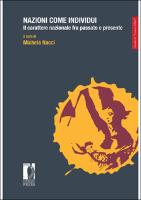Nazioni come individui
Il carattere nazionale fra passato e presente
| dc.contributor.editor | nacci, michela | |
| dc.date.accessioned | 2022-05-31T10:34:55Z | |
| dc.date.available | 2022-05-31T10:34:55Z | |
| dc.date.issued | 2020 | |
| dc.identifier | ONIX_20220531_9788855181600_891 | |
| dc.identifier | OCN: 1317711169 | |
| dc.identifier.issn | 2704-5919 | |
| dc.identifier.uri | https://library.oapen.org/handle/20.500.12657/55607 | |
| dc.language | Italian | |
| dc.relation.ispartofseries | Studi e saggi | |
| dc.subject.other | character | |
| dc.subject.other | nation | |
| dc.subject.other | individual | |
| dc.subject.other | causes | |
| dc.title | Nazioni come individui | |
| dc.title.alternative | Il carattere nazionale fra passato e presente | |
| dc.type | book | |
| oapen.abstract.otherlanguage | The theory of national characters sees an individual in every nation. Each individual has a body, a face, a character. The same goes for nations: every nation has a body (the land), a face (the fisionomy), a character. Kind or bad, active or passive, idle or diligent, feminine or masculine, every nation expresses a principle. A single principle, different from that of every other nation. What makes a nation possess a certain character? Authors are divided on this matter: according some it is the climate (both for the influence it exerts and for the reaction it provokes), according someone else it is history, and we find among the possible causes language, race, territory, religion, institutions, customs or a set of all (or part of) these elements. The volume examines this theme in Hippocrates, Aristotle, Bodin, Dubos, Kant, Leopardi, Cuoco, Michelet. | |
| oapen.identifier.doi | 10.36253/978-88-5518-160-0 | |
| oapen.relation.isPublishedBy | bf65d21a-78e5-4ba2-983a-dbfa90962870 | |
| oapen.relation.isbn | 9788855181600 | |
| oapen.relation.isbn | 9788855181594 | |
| oapen.relation.isbn | 9788855181617 | |
| oapen.relation.isbn | 9788855181624 | |
| oapen.series.number | 214 | |
| oapen.pages | 158 | |
| oapen.place.publication | Florence |

